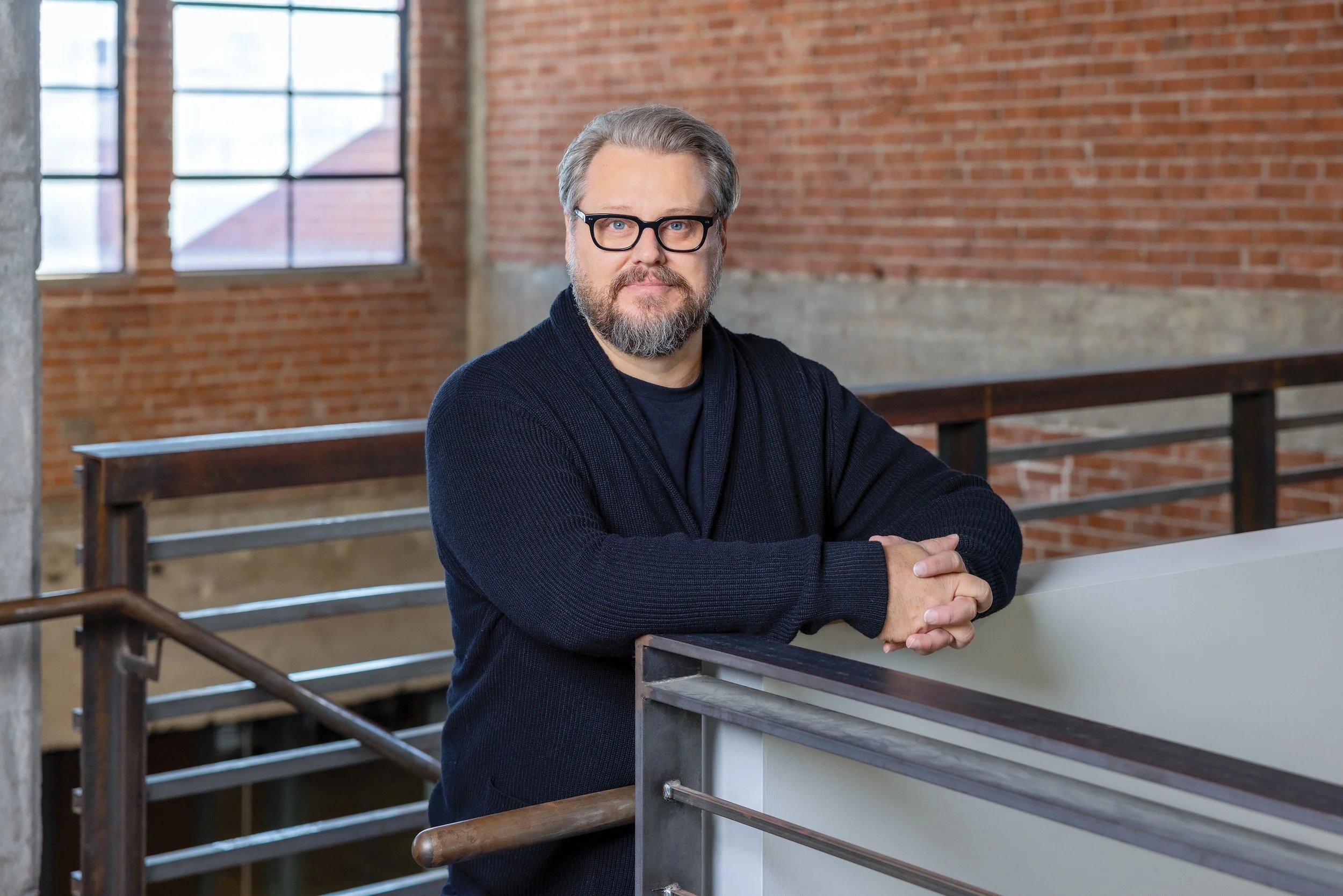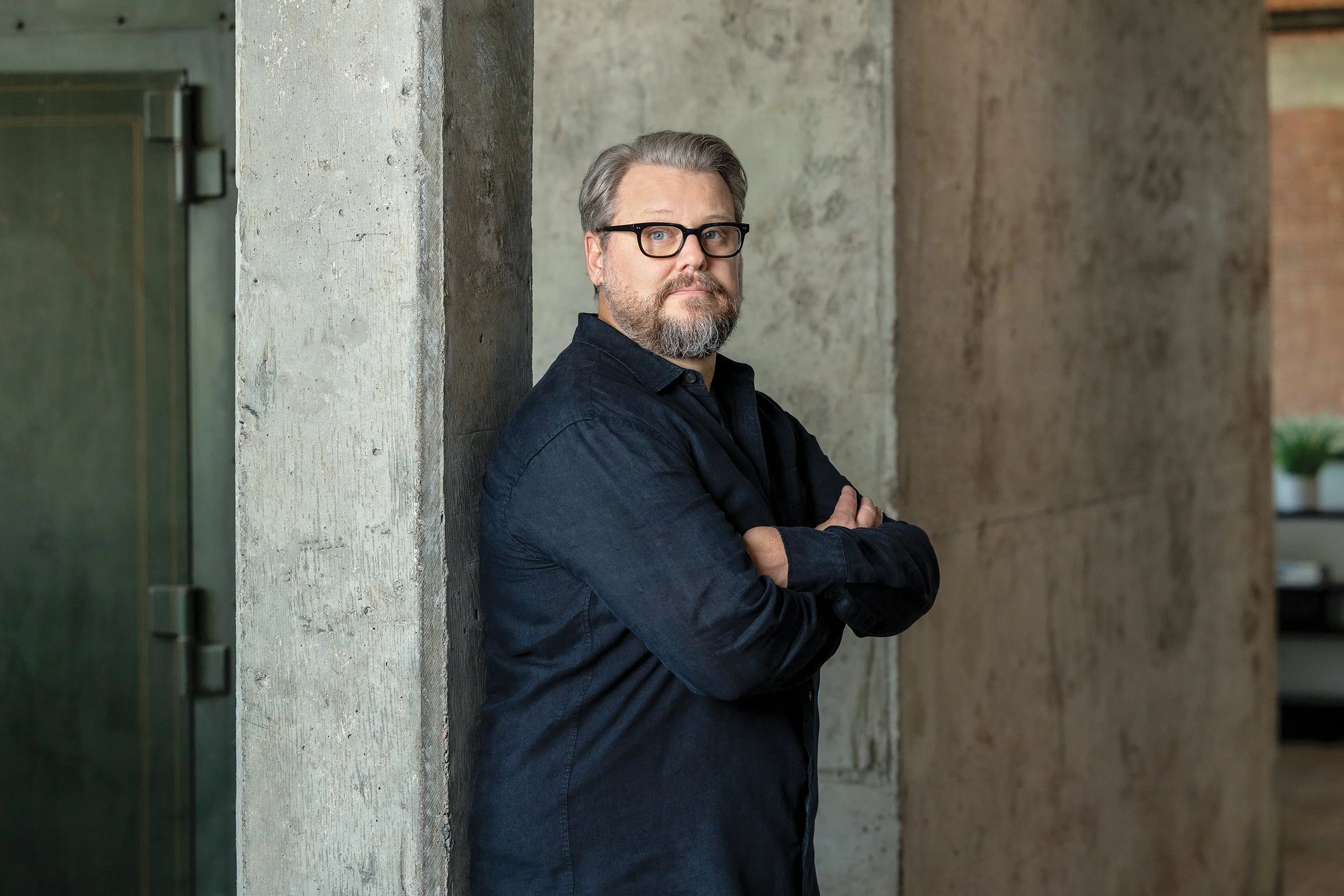Reclaim & Reuse
Cory Skaaren gives unwanted paper a second chance at life
By Kaylor Jones / Photos by Claudia Johnstone
After 30 years in the business, Cory Skaaren knows that design is all about telling timeless stories. Skaaren’s own story, which led him to becoming an award-winning designer and creative director, began at a young age.
“I grew up in the middle of nowhere in rural Minnesota, where snow and ice covered the ground for nine months out of the year. My saving grace was access to movies, books and comic books,” says Skaaren, who taught himself how to draw with the dream of telling stories visually. “As a kid, I imagined I’d do that through comics or film, but what I ended up doing was telling company stories through branding and other forms of visual communication.”
Now, as the owner of Skaaren Design (www.skaaren.com), he helps small and mid-sized businesses build thoughtful brands through editorial and magazine design, product design, branding, logo design and more. No matter the project, it comes down to striking a balance between innovation and tradition, art and commerce.
This theme is also evident in his newest venture, Resketch (www.resketchbrand.com), a notebook company that’s rethinking sustainability.
There’s no shortage of unwanted yet perfectly usable paper. Often, that paper is recycled – much better than being thrown in a landfill, but an energy-intensive and chemical-filled process all the same. Plus, paper fibers can only be recycled so many times before they break down and become unusable.
Resketch swoops in to rescue that unused paper – 8 to 10 tons of it every year – and give it a second life before it’s submitted to the recycling process, saving resources and reducing the environmental impact.
Skaaren is aware that his decades-long career in print and publication design means he has personally contributed a fair amount of paper to the waste stream.
“The truth is, if you do it right, the creative process can be wasteful. Thumbnails, notes, sketches, mood boards – they all add up,” he says. “Resketch is my way of giving back. It’s also a chance to offer creatives – designers, writers, architects and others – tools that make the process more sustainable. That matters to me.”
Trash to Treasure
When Creative Director Skaaren first tackled Resketch’s rebranding, it was important to him to subvert the typical perception of notebooks as novelty items.
“My goal was to create a timeless, workmanlike brand that elevates both sustainability and creativity without leaning too hard on either. Many eco-friendly brands make the sustainability message the whole story. I wanted to build a great notebook brand first, and it just happens to be the most sustainable one out there. They’re also well-designed, functional and built to be used.”
There are additional benefits to using rescued materials – unlike a typical blank notebook, every page in a Resketch notebook has something different to offer. Some pages might be graph paper, others old calendars or blueprints.
“We quickly saw how the variety of paper stocks and textures affected how people worked,” Skaaren says. “When your brain encounters a new type of page, it responds. It forces a small shift in how you approach the next thing you write, draw or plan. That variety creates just enough friction to spark curiosity, opening the door to more playful, original thinking.”
Skaaren always loves watching someone pick up a Resketch notebook for the first time, expecting standard blank or lined pages. “But then they realize it’s this beautiful, unexpected mix of paper. A smile slowly spreads across their face. They say, ‘Oh my God, where do you get your paper?’ I love that. How cool is it to surprise and delight someone with something as simple as paper?”
Crafting a Community
Skaaren also serves as the president of the Arizona chapter of the American Institute of Graphic Arts (AIGA). The volunteer-led organization offers resources for design professionals and students, as well as initiatives like Phoenix Design Week. The goal is to build connections between members of the local creative community, something Skaaren feels privileged to play a part in.
“I say this every chance I get – the less we need each other, the worse the world gets. Community is the answer,” he says. “Community is built by the people who show up, so you have to show up.”
The Arizona community in particular has a spirit all its own, Skaaren says. “We represent the Wild West, and nothing else in American culture quite matches that. There’s still a bit of that rebellious, outsider mindset in our DNA. I think a lot of interesting things come out of a creative community with that kind of energy at its core.”
This energy is a big part of why Skaaren has no plans to slow down – among his goals for 2026 are seeking out new experiences at Skaaren Design.
“I want to focus on helping startups launch and showing them how branding and visual communication can shape their business from day one. Starting something new can be overwhelming and expensive, but good design makes that investment worthwhile. Every business should have access to that.”
As for Resketch, the plan is to keep building its network, rescuing larger quantities of paper and creating more sustainable tools that support the creative community.
“I hope that work inspires others to do the same. Everyone has a story to tell, and we want to be part of that process.”


